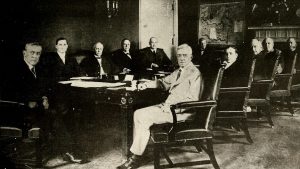President Woodrow Wilson (in office 1913-1921) is best known for his role in leading the United States through World War 1, but his foreign policy also significantly shaped the country’s role in international affairs, even after the first world war. Wilson believed that the US should act as an idealistic leader on the world stage, championing democracy and human rights. While this approach had mixed results, it helped define America’s place in the world and set the course for its future foreign policy.
Principles of Wilsonianism
Wilson’s approach to foreign policy, or “Wilsonianism,” as it came to be known, was shaped by Wilson’s own idealistic views of the world. It is based on the idea that the US should promote democracy in the international arena by advocating for self-determination, which is the principle that all people have the right to choose their own government without interference from other nations. While he did not directly advertise democracy, he believed that so long as other countries did not intervene, a nation would eventually adopt a democratic form of government. This approach was motivated by Wilson’s belief that democracy was the best form of government and that it would naturally spread throughout the world.
He made several major speeches outlining his views, including the Fourteen Points speech in 1918. The Fourteen Points were a set of principles that Wilson believed would promote world peace and stability. They included calls for self-determination, free trade, arms reduction, and an end to secret treaties. He also promoted the idea of internationalism, or the cooperation between nations to solve problems and keep the peace. This was a departure from the isolationist approach that had characterized American foreign policy up to that point. Multilateralism, or the idea that multiple nations should work together to solve problems or pursue common goals, was a key component of Wilson’s foreign policy.
Criticisms of Wilsonianism
Wilson’s foreign policy largely succeeded in achieving its goals, although it did lead to some tensions with other countries. In particular, his decision to send troops to fight in World War I was met with criticism both at home and abroad. He argued that America had a responsibility to help other nations and that it was in the country’s best interest to do so. Wilson believed that the US could not remain isolated from the rest of the world and still be safe and prosperous. Over the years, idealists have praised Wilsonianism for its moral vision while at the same time criticized by realists for its naivete.
